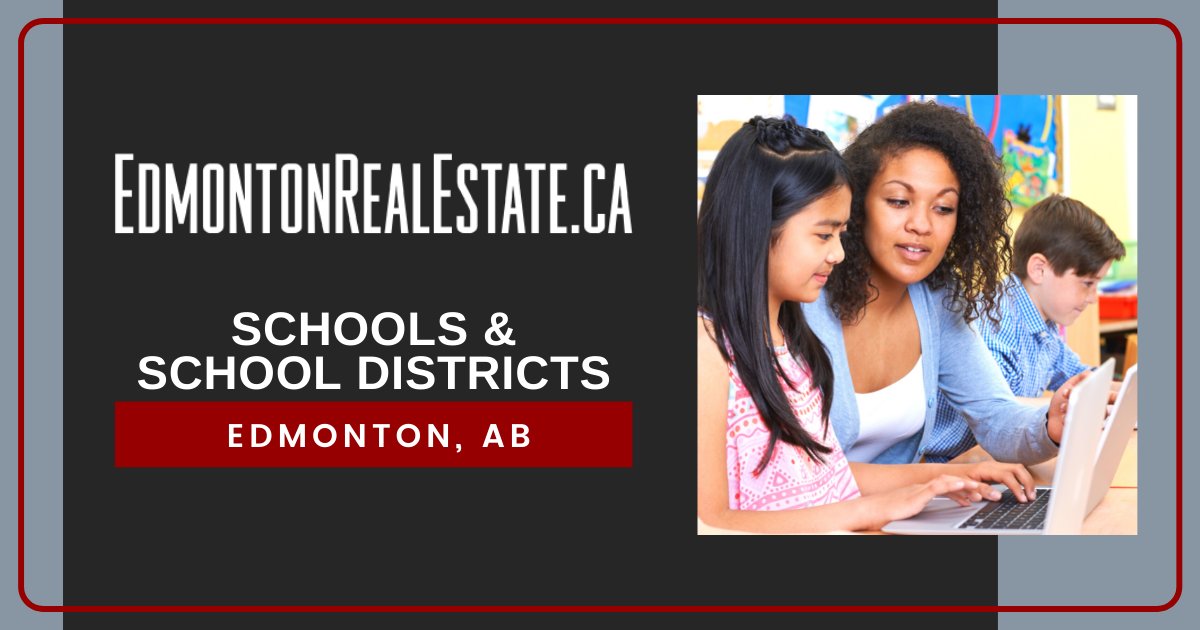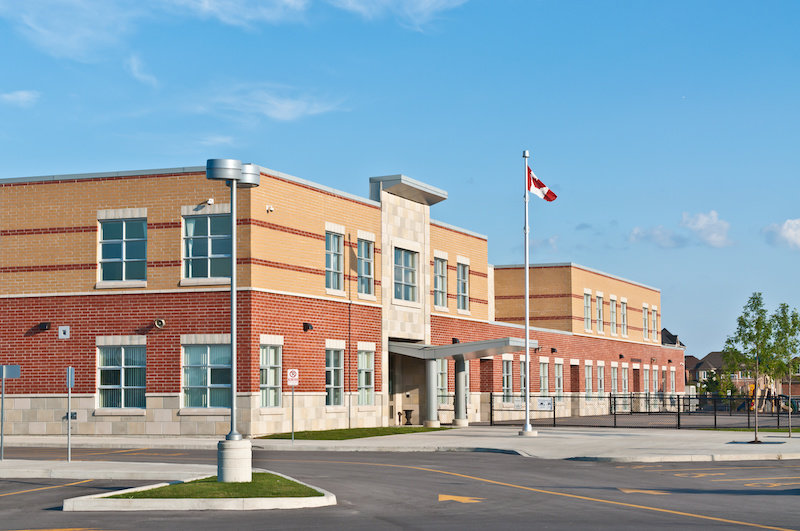Edmonton Schools and School Districts: Edmonton, AB Schools Guide
Posted by EdmontonRealEstate .ca on Wednesday, June 2nd, 2021 at 6:38am.

Education is a cornerstone of opportunity. Few other factors hold more power over the eventual outcomes of our lives than what we have learned. That is why considering a community's education system can be a vital part of deciding if relocating is a good idea. While lake homes and luxury housing are undeniably attractive, the public and university education programs must be part of the decision equation.
Nicknamed "Canada's Festival City," Edmonton has a current population estimate of about 932,546. With a metro population of 1.3 million residents, it's the sixth-largest area in Canada as of 2016. Here are a few things that future residents should understand about Edmonton's schooling options.
Public School Districts Serving Edmonton
 With around 104,930 students as of the school year beginning 2019, the Edmonton school district manages 213 schoolhouses. Like most public schools, they provide instruction for kindergarten through twelfth grade. Approximately 125 of the institutions offer elementary education, while another 27 are dedicated to junior high programs. High schoolers receive education through 14 facilities.
With around 104,930 students as of the school year beginning 2019, the Edmonton school district manages 213 schoolhouses. Like most public schools, they provide instruction for kindergarten through twelfth grade. Approximately 125 of the institutions offer elementary education, while another 27 are dedicated to junior high programs. High schoolers receive education through 14 facilities.
Several institutions provide instruction for mixed grade levels, including 39 combined elementary and junior high programs and five buildings with all grade levels. Another 13 educational programs are provided through specialized facilities spread across the region. The 2017 budget was around $1.161 billion, making it one of the largest districts in the country. A group of nine elected trustees governs the district. Each position is responsible for a separate city ward.
The first schoolhouse in Alberta was built in Edmonton in 1881. It was called the Mckay Avenue School and was also used for public meetings and court proceedings. Interestingly, the community was one of the first school districts within the country to utilize a school-based decision model. By allowing a more decentralized control method, each principal is solely responsible for the individual school. The leaders are provided with the financial resources and authority to make decisions to shape the institution to fit the needs of the students.
The pilot program for this decentralized process began in 1976, and only four years later, it expanded district-wide. Today, the successful method has been piloted in educational institutions throughout the country.
Understanding this school structure is critical for new residents with school-aged youth. Because of the legacy of individualized school programs, each educational centre has evolved into an innovative school of choice model. New students will need to decide which school best suits their interests.
Edmonton Charter Schools
 Charter schools in Alberta, Canada, differ from public schools in several ways. Like the public schools in Edmonton, charter schools foster innovation and creative approaches to education. Many schools feature a curriculum, methods, and approaches designed to target a particular group of students. The programs seek to provide these students with skills, knowledge, and experience that may help them maximize their potential.
Charter schools in Alberta, Canada, differ from public schools in several ways. Like the public schools in Edmonton, charter schools foster innovation and creative approaches to education. Many schools feature a curriculum, methods, and approaches designed to target a particular group of students. The programs seek to provide these students with skills, knowledge, and experience that may help them maximize their potential.
Charter schools in Alberta are directly managed by the province government, unlike public schools managed by local school boards. Additionally, charter schools are limited in terms of the number of students they may accept, and there can be no more than 15 schools in the province. Unlike private schools, charter schools receive public funding, and as such, there are limitations on the operations.
Edmonton has three charter schools within its boundaries. Chartered in 1996, the Aurora Academic Charter School provides grades K-9 instruction focused on academic achievement. With a current enrollment of about 800 pupils, more recent renovations have included home economics and science lab facilities. Aurora currently has more than 40 instructors covering middle and elementary education.
The Boyle Street Education Center was chartered in 1995. It's focused on providing basic literacy education to high school-aged students whose education was interrupted by life events. The school hosts about 170 students and features an alternative education model. Teachers generally have smaller class sizes and a different approach for their students.
The third charter school in the area is the Suzuki Charter School, which follows the Suzuki learning method in music. Created by Japanese violinist Shinichi Suzuki, the philosophy includes teaching music as a language that is native to the learner. The institution was 10 years old when it was chartered in 1995 and features a music-intensive approach to academics. Today, more than 300 students focus on nine different musical instruments.
Edmonton Private Schools
 In addition to charter and regular public schools, private schools are another option for parents in Edmonton. The province of Alberta has three different types of private schools.
In addition to charter and regular public schools, private schools are another option for parents in Edmonton. The province of Alberta has three different types of private schools.
- Registered private schools do not receive government funding and are not required to use certified teachers
- Accredited, non-funded private schools do not receive government funding but use certified teachers and a privately selected curriculum
- Accredited, funded private schools receive education grants, use certified teachers and administrators, and must use the province approved curriculum
Parents may select private schools based on several factors, including cost, location, class size, and overall philosophy toward learning. For example, West Edmonton Playschool is designed to offer 2- to 4-year-old children a learn-through-play program to prepare them for kindergarten. The school is nonprofit and organized as a parent-cooperative. Rising Scholars Montessori, Inc offers a more flexible approach to learning based on the individual child versus the grade level. Classrooms focus on learning through interactions with full-class and small-group learning exercises.
Progressive Academy provides instruction for grades preschool through 12. School facilities include a technology centre, music rooms, art classrooms, and stages for performances. Students can also be exposed to software coding classes and other STEM initiatives, in addition to crafts and physical exercise programs.
Colleges and Universities Near Edmonton
 While school is certainly a part of youth, learning never really stops for adults. Accordingly, Edmonton also has many colleges and universities in the area. The University of Lethbridge has a campus in the community that offers 150 academic programs at the graduate and undergraduate levels. The academic schools include Arts and Science, Education, Health Science, Management, and Fine Arts.
While school is certainly a part of youth, learning never really stops for adults. Accordingly, Edmonton also has many colleges and universities in the area. The University of Lethbridge has a campus in the community that offers 150 academic programs at the graduate and undergraduate levels. The academic schools include Arts and Science, Education, Health Science, Management, and Fine Arts.
The University of Alberta also has a campus in the Edmonton area. The school has almost 37,000 students and a faculty-to-student ratio of 1:11. They offer undergraduate students more than 200 programs, with an additional 170 graduate school options.
In addition to these, Grant MacEwan University, Concordia University College of Alberta, and King's University College are other university options. King's University is a smaller college with seven academic programs. Grant MacEwan is another small institution with several area campuses featuring specialties.
Learning In Edmonton
One thing is clear: learning in Edmonton is a continuous journey. The community is clearly committed to advancing the minds of tomorrow and preparing for the careers of today. Residents will find no shortage of mental and academic growth opportunities, whether they live in one of Edmonton's walkable suburbs or a master-planned community.
If you're looking for the perfect Edmonton home, contact EdmontonRealEstate.ca in partnership with Justin Havre at (780) 800-9644 to get in touch with a local Edmonton real estate agent and discover your new dream home today.

